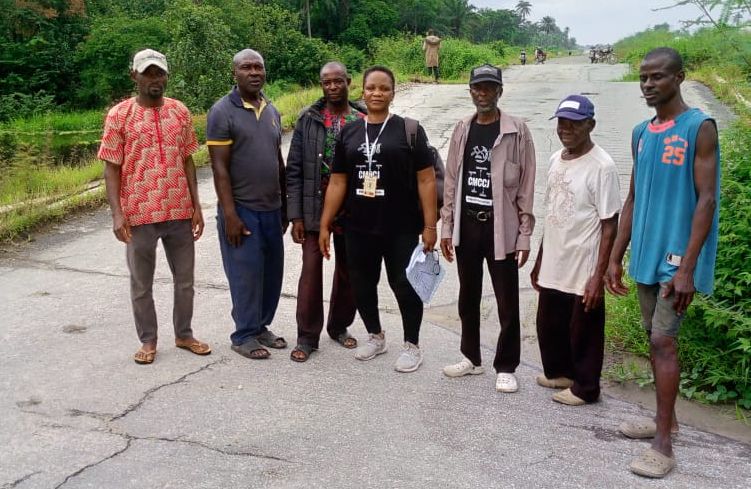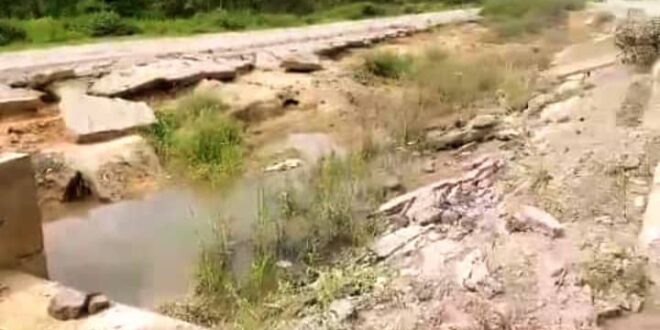… CODE Raises Alarm over Oil Spill in Akpajo Community
By Paul Williams
Non-governmental organization, Connected Development (CODE), community-based organizations and media stakeholders in Rivers State have called on the contractor handling the Ahoada East/ Eleme section of the East-West Road project to account for the N506 billion funds approved by the Federal Executive Council (FEC) for reconstruction of the road.
This followed months of apparent non-implementation of reconstruction or rehabilitation activities for the flood-damaged road, with a resultant heavy financial and physical toll on commuters and commercial transport operators conveying goods and passengers between Rivers and Bayelsa states.
The 2022 flooding in the Niger Delta had washed away portions of the road, halting transport activities and forcing the FEC on November 2, 2022 to approve the sum of N506 billion for the reconstruction of the road and to mitigate the negative impact of the flooding in the area.
Seven months down the line, the road remains as the floods left it, pushing CODE, members of surrounding communities, who suffer the brunt of the problem, community-based organizations and media stakeholders in the state, to rise in a call for the contractor, Setraco, to return to site or account for the N506 billion approved by FEC.
Our correspondent gathered that while tracking the FEC-approved N506 billion road rehabilitation project fund, as part of the Community Media Collaboration for Climate Justice (CMCCJ) project, implemented by CODE and funded by OXFAM Nigeria, Connected Development’s “community based organization and media collaboration team, embarked on a community outreach to Ahoada East Local Government Area on November 13, 2023 to ascertain the level of work done on the Ahoada East axis of the East West Road.
“On a visit to the project site, it was observed that some form of skeletal work had commenced on one side of the road, about two poles. While the very bad portion washed off by erosion remains the same and abandoned, leaving motorists to just one lane of the Ahoada East section of the road, which strategically connects Rivers, Bayelsa, Delta, and Edo states,” the CODE team said.
Further along, at Ulaikata Community, a river divides the East-West Road, with a bridge built across it. According to the CODE team, “we found out that the bridge across the river had collapsed as a result of the flood and a portion of the road sunk deeply into the ground and only suspended by an underground pillar.
“That portion is also in a reckless abandoned state and poses a state of insecurity and increased crime rate with the repeated harassment of passerby and travellers being kidnapped and molested. CODE team was advised to hurriedly finish up and leave the location due to recent criminal occurrences.”
Williams said the team then paid a visit to the Ahoada East council headquarters, where they met the director of Works, Mr. Abraham Chukwuemeka.
“When asked if he was aware of the approved funds, he replied that to the best of his knowledge he was hearing of it for the first time, adding that if such fund has been made available then it is a good step.”
The director reportedly prayed that the funds be well utilized for the purpose for which it has been assigned, and expressed great appreciation towards the effort of the team to track the funds and to engage the relevant authorities appropriately advocating for the completion of the East West Road.
High Chief Abdulrazaaq Philip Echeya, an environmentalist and member of the CODE team, gave a rundown of the visit to the community and collapsed bridge, while keeping the director abreast of the work CODE is doing in their community to ensure that government and the contractor responsible for the reconstruction of the East West road are held accountable for the resources allocated to the project.
The Rivers State lead of FollowTheMoney, an initiative of a Connected Development, Evelyn Williams, informed the director of Works that CODE has been part of the intervention team to the Internally Displaced Persons (IDP) Camp during the 2022 flood and having firsthand information of the situation did a documentary of its impact as a Climate Change situation.
This documentary according to her was used as an advocacy tool through the media to the Federal Government, which she believes also contributed to the Federal Executive Council (FEC) taking the measure to approving the 506 billion quick intervention fund.
She urged the local government council authority to consider the plight and condition of the people in the area and the East West road as a situation of great concern as it directly and indirectly affects the lives and livelihood of rural dwellers also.
Earlier, the CODE team was able to interview some community members at Ulaikata who “clearly told us that the poor condition of the road has grossly affected their economic activities and also hyped insecurity threatening loss of lives and properties on a daily basis every other day.”
Mr. Kingdom Victor said his community plays host to two renowned oil companies but they are greatly impoverished and marginalized. He called on government and other agencies to come to their aid.
When they tried capturing the voices of women on the poor condition of the road and its impact on their livelihood, some declined to speak on camera. However, Mrs Eloeha expressed dissatisfaction on the situation of the road, urging the Federal Government to carry out a quick intervention to stop the daily loss of lives and to reduce crime rate in the area.
Among other road users, Mr. Ned Odegbami, a community leader, also expressed dissatisfaction over the poor condition of the road and called on the Federal Government to take urgent action on reconstructing the East West Road.

CODE stressed that the Ulaikata fallen bridge and collapsed road due to the 2022 flooding in Rivers State serves is a death trap and a hub for criminal activities.
“CODE is asking the Federal Government of Nigeria and the contractor awarded the contract to treat this as a matter of urgency and to give an account of how the 506 billion Naira approved and awarded by the Federal Executive Council was expended, and to explain why the Ahoada East West Road is still in a deplorable condition after billions of naira had been pumped into the construction and reconstruction of the road,” they said.
Recently, as part of its effort to achieve climate justice in the Niger Delta, Community Media Collaboration for Climate Justice (CMCCJ) project, funded by OXFAM Nigeria, Connected Development equally raised alarm over “the present and impending danger confronting the Akpajo Community, in Eleme Local Government Area of Rivers State following an oil spill in the community.
Our correspondent gathered that the spill, which was from a yet to be confirmed leak on the Shell Trans Niger Pipeline, pushed an unspecified quantity of oil into the Okulu River in the community.
The incident, which took the community unawares, CODE was to learn later, instantly polluted the river, killing aquatic animals and shattering the lives of the fisher-folk.
One of the fishermen, who gave his name simply as Wuwu, said, “On Monday I came to check my net, but I saw that the river was ‘black’ and spoiled. I couldn’t even find my net.
Wuwu and other fishermen expressed anger that their source of livelihood had been destroyed, adding that they could no longer cater to their families’ needs.
In a response, CODE’s lead for Rivers State, Evelyn Williams, noted that the “spill reported from a facility belonging to SPDC Ltd” has led to the pollution of Okulu River, loss in aquatic lives and equal job-loss for the fisher folklore.
CODE further noted the danger posed to aquatic lives and the health of the populace, and stressed the urgent need for intervention.
It stressed the need “For the authorities to conduct a joint investigation visit (JIV) to determine the cause of the spill, hold the polluter accountable, clean up the spill, compensate affected indigenous persons and stop further pollution in the area.”
CODE lamented that “despite the gravity of this spillage and the environmental disaster it poses, calls to Shell by community members have remained unanswered. We are calling on Shell to take immediate action to mitigate the devastating impacts this spill is having on the ecosystem, health, and livelihood of affected communities
“We are also calling on the Federal Government of Nigeria to review and strengthen existing regulations related to oil spill prevention, response, and liability. Implement stricter measures to hold responsible parties accountable,” they said.
Oil spills have remained a common feature in the Niger Delta in spite efforts by civil society groups to have the trend checked. Unfortunately for the Niger Deltan, combined with the harsh effects of climate change, flooding and rising sea levels, oil spills have compounded the environmental nightmare in the second largest wetland in the world.
 PH Mundial – Port Harcourt Online Newspaper News Across The Region
PH Mundial – Port Harcourt Online Newspaper News Across The Region

